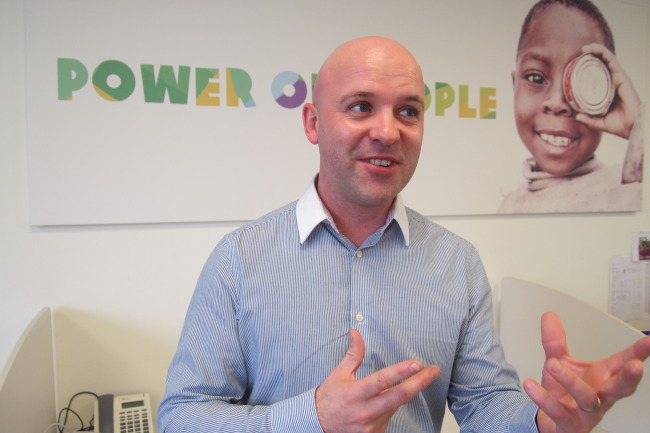With a new office in Seoul, Oxfam is ready to forge partnerships with other relief groups, businesses and civil society here to fight poverty, inequality, climate change and other global challenges, a senior official at the organization said.
 |
Chris Ashworth, international market development manager at Oxfam Great Britain |
Chris Ashworth, international market development manager at Oxfam Great Britain, played a key role in the office’s launch in October.
While carrying out fund-raising campaigns, his team here will increase efforts to engage with the Korean public, which Ashworth described as having a “very strong sense of social justice and empathy.”
“Our concentration in the early years will be to be self-sustaining; engage with the public on our issues and on our humanitarian work, for example, and hoping that we are well supported with people’s generosity,” he said in an email interview with The Korea Herald.
Ashworth, who was previously in charge of corporate partnerships at Oxfam, stressed the significance of cooperation with the private sector in promoting good practices and tackling common tasks, yet vowed to remain as a “critical friend.”
“We would never exist to serve the interests of multinationals, but engage with the right ones at the right time; those who are open to progressive policies and practice,” he said.
“So the future vision for me is one where we bring our experience to bear on relationships. Where we are a critical friend; prepared to represent vulnerable people first, appeal for changes to systems and structures that increase inequality but balance that with practical, innovative partnerships where we work with open-minded and progressive organizations and institutions on common challenges.”
The U.K.-headquartered agency was born in 1942 and named after the Oxford Committee for Famine Relief formed by a group of Quaker intellectuals, social activists and University of Oxford academics to support refugees in Nazi-occupied Greece.
Oxfam is seeking to play a vital role in the global decision-making system by helping create a level playing field and keeping vested interests in check, while supporting the underprivileged with fundamental needs.
“On a day to day basis supporting poor communities with both their practical needs such as access to clean water and education and on a global stage with key institutions is where Oxfam adds most value ― combining two very different approaches of practical and systemic change into a cohesive vision,” Ashworth added.
The group’s ties with Korea date back to the 1950-53 Korean War. It began its work in North Korea in 1997, providing food handouts on a yearly basis to poor rural communities and children in orphanages chiefly through its Hong Kong unit. It also supplied fertilizers, hand tractors and diesel fuel for agricultural rehabilitation in the impoverished country.
“In 2012, Oxfam redesigned its program in North Korea, hoping to incorporate new elements beyond humanitarian response,” Ashworth said. “In the meantime, North Korean aid programs have recently been resumed by Oxfam Hong Kong.”
At last month’s Davos forum in Switzerland, Oxfam drew the limelight by unveiling a report predicting that the richest 1 percent of the world’s population may own more than all the rest by 2016, if the trend goes unchecked.
In Asia, longstanding discrimination against women and ethnic minorities has placed the region “at a crossroads,” Ashworth noted.
Soaring inequality has also emerged as a hot potato in Korean society. Criticism is widespread over the lopsided relationship between family-owned conglomerates and their contractors. In December, a Korean Air executive, the daughter of the company’s chairman, enraged many Koreans for delaying a flight after being served nuts in a bag, not a bowl.
“Asia’s phenomenal economic growth over the past two decades is a remarkable success story in the fight against poverty. However, this growth has also led to a sharp widening of the gap between rich and poor,” he said.
“Limited economic opportunities and exclusion from political power can trap such groups at the bottom of the ladder. … I’m sure some of those messages resonate with Korea, to some extent domestically but more widely in the region.”
By Shin Hyon-hee (
heeshin@heraldcorp.com)








